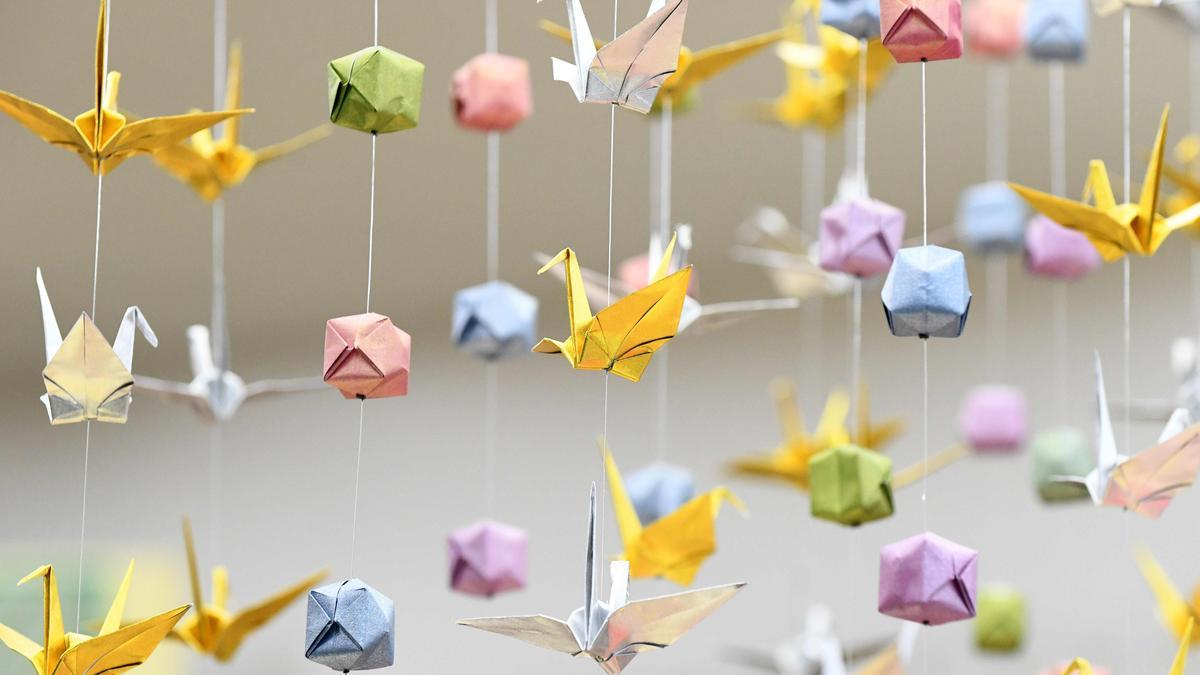
In a country that finds joy in cultural diversity and regional art forms, thousands of children across India are uniting to embrace a universal symbol of peace — the origami crane. This initiative is inspired by Sadako Sasaki, a little girl from Japan whose touching story continues to resonate worldwide. Sadako, a victim of the Hiroshima atomic bombing, believed that folding 1,000 paper cranes could grant her a wish, a belief rooted deeply in Japanese tradition. Lying in the hospital, battling leukaemia — a consequence of the bombing — she embarked on a journey of hope by folding paper cranes, yearning for health and healing.
Though Sadako Sasaki passed away on October 25, 1955, just a decade after the tragic events, her legacy lives on. Her story became a global symbol of peace and resilience, inspiring countless people to carry forward her wish for a world free of conflict and suffering. In a remarkable tribute to this sentiment, the Cuckoo Movement for Children and origami trainer Thiyaga Sekar’s Peace of Paper studio have launched an initiative to encourage children across India to fold 1,00,001 origami cranes. These cranes will be sent to the Children’s Peace Monument at the Peace Memorial Park in Hiroshima, echoing Sadako’s original journey and contributing to a message of love and unity.
“A paper does not differentiate or divide people,” says Sivaraj of the Cuckoo Movement. His statement resonates with the mission of the initiative, which seeks to show that diversity should be celebrated. “It can turn into a butterfly, a deer, a tiger, a snake…showing that on this planet, every life form is equal.” At a time when the world is fraught with division and hostility, the initiative aims to spread the message of inclusivity and hope that Sadako symbolized.
Engaging with educational institutions across the nation, Thiyaga Sekar, a proficient origami trainer who has shared his skills with hundreds of children for over 15 years without charge, embarks on a momentous expedition. Thiyaga Sekar can fold over 500 intricate origami patterns and aims to share this artistic meticulousness with students far and wide, especially in remote locations.
. His journey begins in Sathyamangalam, where he will visit tribal schools in the surrounding villages of Erode district, Tamil Nadu. These sessions aim to teach the significance of each fold and crease in the crane, symbolizing human perseverance and the delicate balance of life.
His mission then extends to other regions, with ongoing discussions with Narmada Bachao Andolan’s Narmada Jeevan Shalas, schools located in tribal hamlets of Maharashtra. Everywhere he goes, Thiyaga Sekar brings more than just lessons in crafting — he carries a message of solidarity, echoing the timeless values Sadako Sasaki instilled in the world.
October 25 marks not just any date, but Sadako’s remembrance day, a day that holds special significance for this initiative. On this day, Thiyaga Sekar will release the second edition of his acclaimed book Kaagidha Kokkugal (Paper Cranes), initially published in 2019, at the Government Tribal Residential School at Solakanai, Erode district. The book, expected to serve as both a learning tool and a symbol of cross-cultural appreciation, includes 30 sheets of chiyogami paper with instructions on folding an origami crane, penned in both Tamil and English.
By the conclusion of this expedition, it is Thiyaga Sekar’s heartfelt aspiration to gather at least one lakh (100,000) origami cranes for the Peace Memorial. As the cranes fly to Hiroshima, they carry the hopes and dreams of children from various backgrounds, a representation of unity beyond borders and cultures. “Children and educational institutions can also send us cranes that they make,” says Sivaraj, emphasizing that one lakh is merely a benchmark — there are no limits to the number of cranes aspiring peace advocates can accomplish.
To contribute, completed origami cranes can be sent to Peace of Paper Studio, Cuckoo Forest School, Puliyanur village, Singarapettai, Krishnagiri District, Tamil Nadu – 635307. For more details, individuals can reach out via phone at 9677078360.
Published on October 24, 2024, this initiative continues to embody the values of cultural empathy, artistic expression, and peaceful coexistence, principles that Sadako cherished in life and which continue to inspire action generations later.












